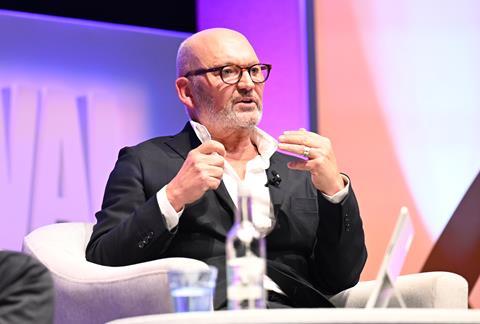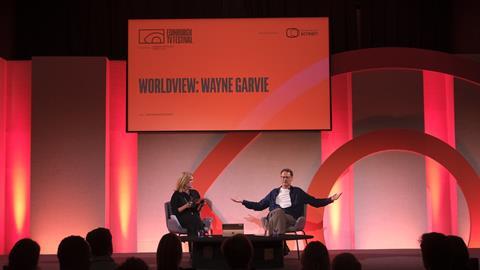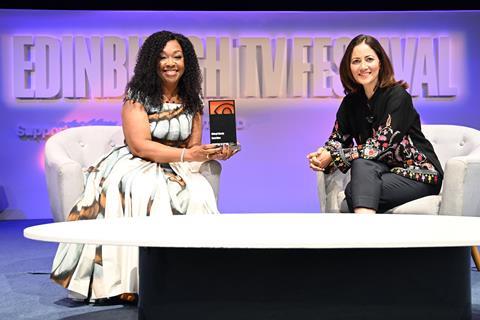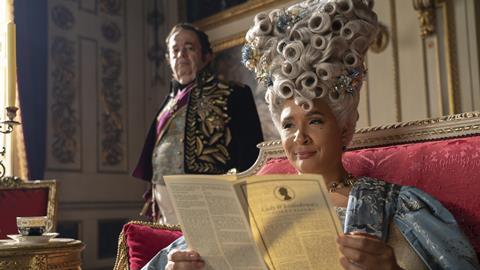YouTube clamour, commissioning overhauls and creator economy pivots underline industry transition
Much of the talk in the Scottish capital this week – at least within the confines of the Edinburgh TV Festival – reflected a content industry grappling to come to terms with the unyielding pace of change.
While millions of tourists traipsed the streets of Edinburgh to attend the gloriously wide range of Fringe events on offer – plus a sold-out AC DC concert at nearby Murrayfield - the great and the good of the UK TV industry were beavering away discussing what’s next for their sector.
While news about new slates, potential job changes and a little sniping from senior UK execs made domestic headlines, the likes of Shonda Rhimes and Sony’s Wayne Garvie helped to provide some global perspectives.
Paramount’s plans
International headlines last week had been dominated by Paramount and the company followed up this week by confirming its deal with Stranger Things creator the Duffer brothers. But there was also plenty of talk in Edinburgh about the US company’s plans for its international assets, which range from Network 10 in Australia to 5 in the UK.

Paramount chief exec David Ellison has talked about the importance of the company’s global assets, while newly installed president Jeff Shell has also indicated that linear networks are still part of the plans.
Suggestions to Broadcast International from a handful of well-placed sources were that US execs had come to London recently to run the rule over 5, somewhat sceptical of its place in the new-look organisation, but returned home impressed.
It was a narrative underlined by content chief Ben Frow, who said he had spoken to newly installed international chief Kevin MacLellan and felt buoyed by discussions.
“I had a conversation with the new boss who said he was very keen on Channel 5 and very impressed with what we do and thinks we can do a lot more for the business,” Frow said. “He speaks my kind of language.
“I’ve always had my eye on my responsibility and what I’m supposed to deliver. I also think we’re incredibly creative and if you go back to very original Paramount [the Redstones’ motto] was ‘content is king’ and content is still king - we’re really good at doing content.”
Clamour for commissioning change
While producing content remains the name of the game, Banijay UK chief Patrick Holland was among those making impassioned pleas to overhaul the process to get that content onto screens, arguing the commissioning process is decades out of date.
Holland added that the industry needs “to ask fundamental questions as to how shows get commissioned” and the cost of development versus rewards.
“Our industry, even with the streamers, still uses a commissioning process from the 1990s,” he said, adding that Banijay is exploring putting more financing into its new shows and going direct-to-consumer with projects.
Zinc Media Group chief exec Mark Browning also called for change, describing the UK’s commissioning culture as “medieval”.
Sony’s Garvie also called for a shift. “We’ve got ourselves into a bit of a pickle where we have professional cadres of commissioners who aren’t empowered by the people who put them into their jobs.
“Consequently, to get an idea away, you need to speak to that person who needs to convince another person and then they all have a role in the production. And it goes on and on.
“Meanwhile, the fastest growing channel in the world is YouTube and guess what, it is self-commissioning. There might be a lesson in there,” he said, receiving a spontaneous round of applause from the audience.
Creator calling
While YouTube’s growing popularity among UK viewers has been in no doubt for many years, there has perhaps been less attention paid to the Google-owned service by some of the country’s producers.

Judging by the queue snaking through the Edinburgh International Convention Centre for the YouTube panel, that has now changed, even if the route to market – or at least profitability – remains unclear.
It still seems that those working internationally are among the loudest voices urging producers to change mindsets, with Sony’s Wayne Garvie taking up the mantel in Edinburgh. Producers must “pivot, change and adapt” to profit from the fast-growing creator economy before TV advertising money dries up, Sony Pictures Television’s (SPT) international production chief said.
“As a TV producer you now need to create for every platform. Very, very soon, that ad money is going to fall down, and it’ll be in going into that [creator] world. You have to pivot, change… and adapt.”
Garvie has already put his money where his mouth is, appointing former BBC Studios and 4Studio exec Matt Ford to lead its digital-first original content in the country, while broadcasters including the BBC talked up YouTube’s potential here in Edinburgh. The inevitable tide is turning.
Universal Int’l Studios eyes UK expansion
There may also be a shift for UK scripted producers, many of whom have faced a seriously tough time over recent years.
Garvie said he was seeing green shoots in the US that suggest interest in the UK is increasing, while Universal International Studios’ Kelsey Balance also talked up the country’s potential.
UIS is looking to “double down” on its scripted activity in the UK, she said, with increased investment into labels and production on the cards.
The NBCUniversal-owned division owns a handful of UK-based outfits including Carnival Films, Heyday Television and Working Title, but UIS’s exec vice-president of global scripted series said shows such as Carnival’s The Day of the Jackal had improved confidence levels in the ability of British shows to travel, particularly in the US where it was a hit on NBCU’s streamer Peacock.
“We are really investing in shows [in the UK], using our infrastructure to make global hits, using the US as a tool to get shows made,” she said.
Asked by moderator, Sony’s Wayne Garvie, about “expanding your footprint with other labels” in the UK, Balance was unequivocal. “Absolutely, we are really ambitious about growing in the UK market.”
All eyes on Shonda
Bridgerton, Grey’s Anatomy and Queen Charlotte creator Shonda Rhimes was also in town - a notable coup for the Edinburgh event – and provided a deep dive into both her professional and personal lives.

She admitted Donald Trump’s presidency had “fundamentally changed” her understanding of her country and said “self-censorship” is taking place in the US, adding that she is “struggling to understand what America is under Trump”.
“I try to keep [Shonda and Shondaland] separate [politically]. My job may be to march and be angry, but my job at Shondaland is to entertain,” she explained. “But I won’t ever stop being politically active, I like being engaged.”
The far-reaching discussion also saw Rhimes discuss the future of Bridgerton – which will run to eight seasons, as per the novels – and how she landed on the show, picking up the novel on which it is based while sick in a hotel.
Rhimes also provided a blueprint for monetising scripted, describing the show as “a global lifestyle brand with a zillion things attached to it”, pointing to the millions of dollars made from merchandising.
Eyes east
While the Bridgerton creator made it onto stage, the buyer of her shows - Netflix - was not (at least those stages accessible to press). Nor were many of its streamer rivals, with broadcasters making most of the headlines in Edinburgh this year, although international OTT player BritBox was in the house.
The latter’s content chief Jon Farrar has enjoyed a rich run of commissioning over recent months, helped by many US rivals pulling back on coproductions, but he also touched on more nascent drama trends.
Farrar said he expects a “tidal wave” of microdramas to start being produced out of the UK in the next six months, as interest in vertical scripted grows, adding that the company is “looking at this with interest and trying to get a sense of the viability of it and if it is an area we want to play in,” he said.
“It is not clear in the UK market where the supply is in any great volume, but I expect that will change over the next six months, and there will be a tidal wave but we’re not there yet. We’re on the sidelines looking at it with interest.”
Beverley McGarvey, president of Australia’s Network 10 and head of streaming and regional lead of Paramount ANZ, added that there were “lots of conversations” around microdramas in her country too.
“It is interesting. Everyone is looking at [microdramas] but how do you actually make them work,” she said.
“You still have to invest in them, but how do you monetise them? Is it a marketing exercise at this point?
“We’re open to all those things but we haven’t quite yet nailed what comes next,” she said, a fitting reflection of many of the discussions around both the UK and global TV industry this week.









No comments yet